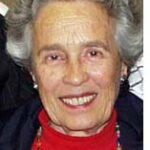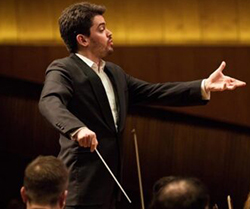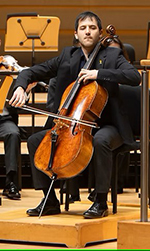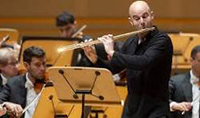By Eileen Wingard


COSTA MESA, California — Lahav Shani, the tall, young Israeli conductor of the Israel Philharmonic Orchestra (IPO), came on stage with confident stride and mounted the podium at the Segerstrom Concert Hall in Costa Mesa for the final program of the IPO’s USA tour. This March 26 concert was preceded by appearances in New York City, Miami, Palm Beach, San Francisco and Los Angeles.
For the first time, in its 88 year history, the IPO has a native-born Israeli as its Music Director. The 36-year old Sabra, born in Tel Aviv, had his excellent early training, as pianist, string bass player and conductor, in Israel. He later attended the Hans Eisler Conservatory in Berlin, where conductor and pianist, Daniel Barenboim served as his mentor.
The concert began with impressive renditions of the national anthems of the United States and Israel. Both, brought tears to my eyes as “the land of the free and the home of the brave,” is under assault, and Hatikvah (the Hope), with words hoping for a Jewish homeland, which is now fighting its longest war and struggling from internal strife.
“Prayer” by Zvi Avni was the first program offering, a work for string orchestra written by the 97-year old dean of Israeli composers when Avni was still a young man whose path included graduating from the Tel Aviv Music Academy at age 31 and further study at Columbia University and the Berkshire Music Festival at Tanglewood.
“Prayer” opens with a plaintive melody intoned by the violas and soon taken up by the other strings. The meditative opening soon morphs into a jazzy, American-influenced ecstatic dance. It follows with another melodic interlude, this time with tremolo and harmonics in the higher strings. After the dance-like section returns with polyphonic turbulence, the original melody returns, closing softly. The beautiful sound of the IPO strings, particularly the violas, melted the heart.
Coincidentally, the week before this concert, Professor Jacob Goldberg delivered three insightful lectures on the Middle East at the Lawrence Family JCC in La Jolla and joined me for lunch the next day. Goldberg is a good friend of Avni and his wife and of Yoav and Er’ella Talmi and the six had dinner together prior to Goldberg’s coming to California. Goldberg reported that, at 97, Avni is still healthy and active, continuing to compose music.

The next selection featured the 31-year old Israeli-born principal cellist of the IPO, Haran Meltzer, playing Max Bruch’s “Kol Nidrei.” Bruch, a Protestant, befriended Cantor Abraham Lichtenstein of the Orienenburgstrasse Synagogue in Berlin, from whom he learned the “Kol Nidrei” melody. The second section of the work is based on a theme by the British composer, Isaac Nathan’s setting of Byron’s ”Oh! Weep for those that wept by Babel’s Stream.” It serves as a major key contrast to the penitent minor mode of the “Kol Nidrei” melody.
Meltzer, who has served as IPO principal since 2020, and was also a student at the Hans Eisler Conservatory in Berlin, played Bruch’s work with soulful beauty.
The final offering before intermission was Leonard Bernstein s “Halil” (Flute) for solo flute, strings and percussion. “Halil” was written as a memorial to a young flutist killed in the 1973 Yom Kippur War.

The soloist was another Sabra, 31-year old Guy Eshed, principal flute of the IPO. Born in Tel Aviv, Eshed has had an extensive career as soloist, chamber musician and principal flute in orchestras conducted by Zubin Mehta, Daniel Barenboim and others.
Eshel projected the lyrical passages with warmth and the rhythmic sections, resembling dances from Westside Story, with incisive precision.
The moment a few off beat percussive xylophone notes accented the opening string passages, it became recognizably Bernstein’s music.
This piece was first premiered by the great French flutist, Pierre Rampal, and has become a standard in the solo flute repertoire.
After intermission, the IPO returned to deliver a passionate rendition of Tchaikowsky s “Pathetique Symphony” under their virtuoso conductor who led his forces without baton and without score.
The opening movement, with its memorable bassoon solo, was full of dramatic contrasts. The second movement danced with 5/4 waltz-like lilt.
The third movement was a fast-moving march, heralding a triumphant close. The final movement was full of pathos and grief. A fitting close to an artistic experience that reflected the mood many of us are currently feeling.
But the concert did not end there. The clamorous standing ovation drew the conductor back to the podium. Although encores are often light, happy selections, the IPO instead played “Nimrod,” from Elgar’s Enigma Variations, a piece often played on solemn occasions.
As chair of the Music Committee of the East County Jewish Community Center, I arranged concerts for the late IPO principal French Horn, Meir Rimon, the former principal flute, Yossi Arnheim, and the IPO violist, who later served as chair of the IPO Orchestra Committee, Rachel Kam.
Now, only one familiar face remains, Leor Eitan, third flute and principal piccolo. I first met Leor when he was a young teenager, a member of the Kfar Ono Youth Band that came to play in San Diego. The organizers needed homes to house these young musicians and my husband and I hosted Leor and a young trombone player during their stay. Leor is now one of the older members of the IPO. It was good to see him on stage.
The IPO continues to be Israel’s premiere cultural institution and good will ambassador to the world.
Their playing continues to be of top quality and their establishment, to rescue Jewish musicians from the Shoah, symbolizes why the Jewish Homeland was created, to be a safe haven for the Jewish People.
*
Eileen Wingard, a retired violinist with the San Diego Symphony Orchestra, is a freelance writer specializing in coverage of the arts.